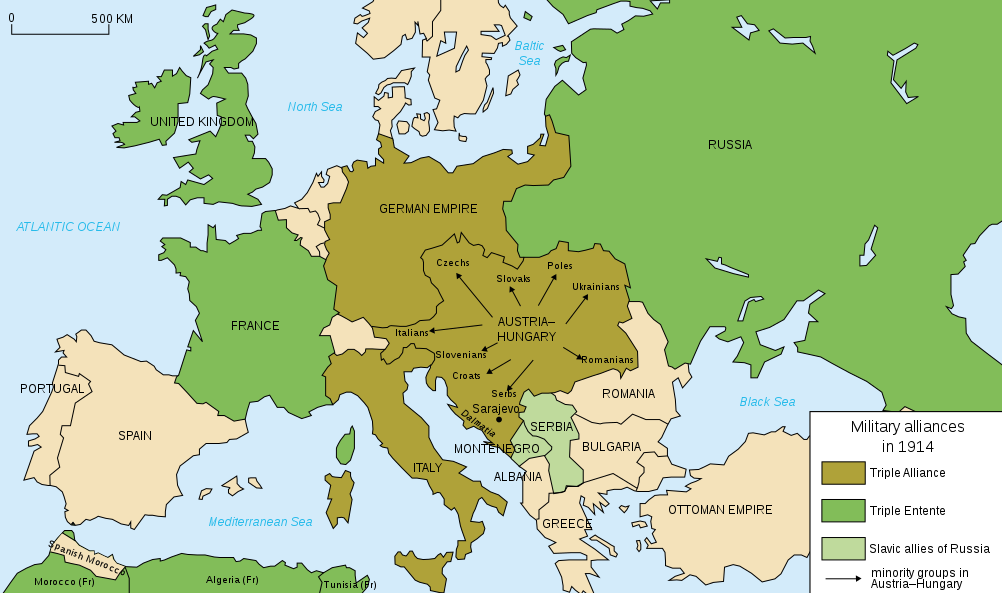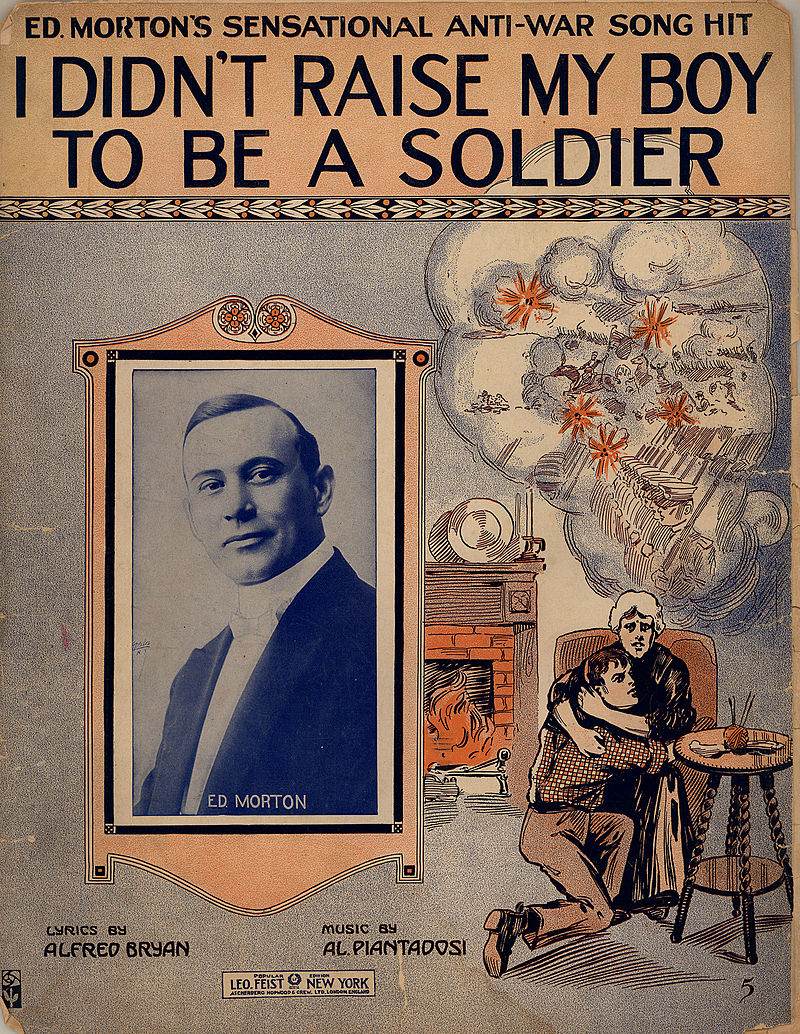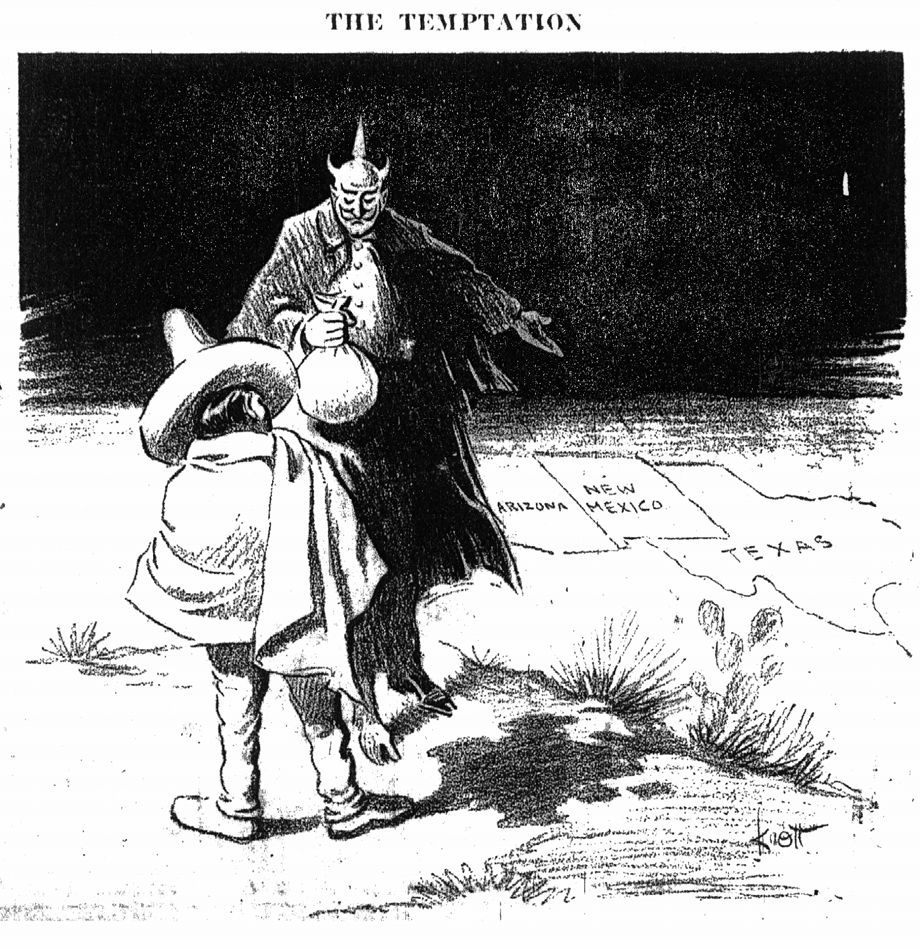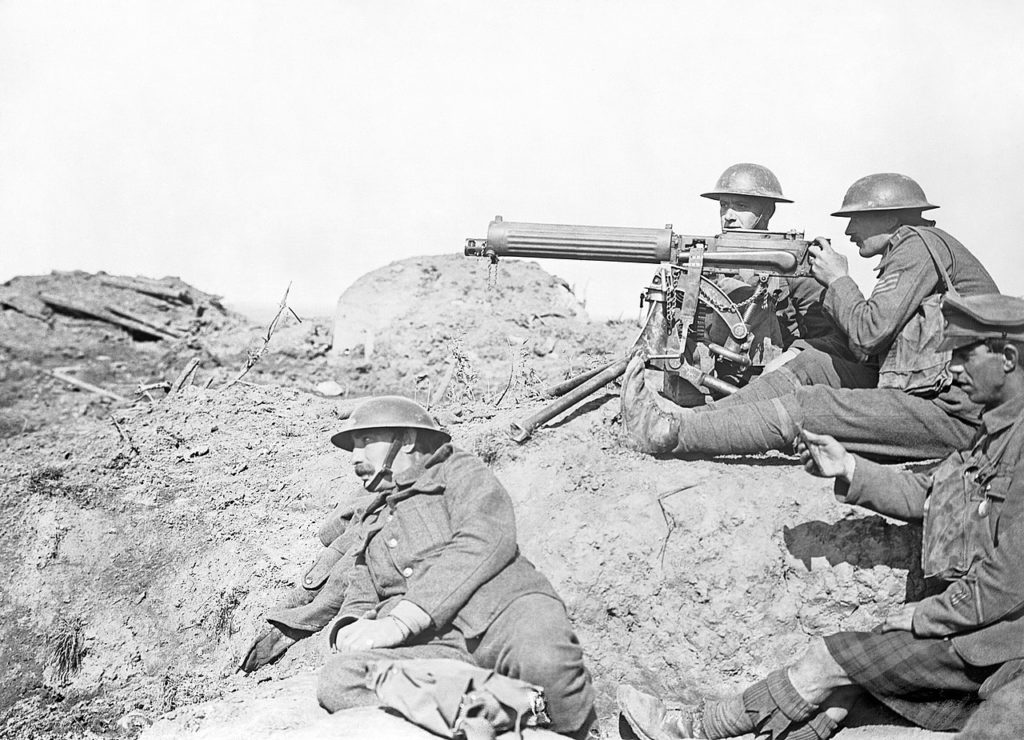INTRODUCTION
When he took office in 1913, President Wilson promised that the United States would be a different sort of neighbor to the countries of the rest of the world. Theodore Roosevelt and William Howard Taft had not been ashamed to use America’s money or navy to push other countries around. But Wilson said he would use America’s power for good. His Moral Diplomacy meant that the United States would fight for people to have more control over their own countries and future. He didn’t like Europeans and how they had colonies around the world. He wanted things to be more fair.
Any student of history can easily see that in Moral Diplomacy Wilson often said one thing but did another. Wilson sent the army into Latin American countries many times, including when he sent General Pershing into Mexico to try to catch Pancho Villa. He didn’t let Puerto Rico, Guam, the Philippines or Hawaii have their independence. It would seem that Wilson’s moral diplomacy was more about telling other countries what they should do, and about the United States being a good example.
However, the greatest test of Wilson’s moral diplomacy was not in Latin America or about colonies. His real test was in World War I. As European countries started murdering one another on the battlefields of France and Belgium, Wilson did his best to keep America out of the war. Americans thought this was a good choice. One popular song of the day was “I Didn’t Raise My Boy to Be A Soldier.”
On one hand Wilson wanted to keep America out of the war, but on the other hand he wanted the United States to be a leader in the world. He wanted America to help decide what the future of the world would look like, and to help make the world a more peaceful place. Since he couldn’t stop the war, how could he use the war to, as he would later say, “make the world safe for democracy?” Could moral diplomacy work in the real world? Could good come out of World War I, which was so bad?
ALLIANCES IN EUROPE
1915 marked the end of many years of peace between the world’s most powerful countries. 100 years before, Europeans had worked together to defeat French Emperor Napoleon. After Napoleon’s defeat, leaders from the United Kingdom, France, Prussia, Russia, and Austria met and decided that power in Europe was even, no country could overpower the others and start another war.
But then in 1871, many small German countries joined together to make the German Empire. Austria-Hungary, Italy, and Germany started an alliance, or agreement to be friends. This upset the old way of keeping the peace. Most worried was France, an old enemy of Germany. But Germany and Great Britain still got along since Germany had not built a navy that might challenge British sea power.
During this time, Queen Victoria of Britain built friendships between countries in her own way. During the 1800s, she had her children marry into many of the royal families of Europe, believing that this would help those countries get along better. By the start of the 1900s, the Kaiser, or king of Germany and the King of England were cousins, as were the Tsar and Tsarina of Russia.
In 1890, Kaiser Wilhelm II decided to build up the German navy, which upset Great Britain. As an island country with many colonies, the British had always tried to have the biggest and strongest navy in the world. As a result, the great countries of Europe started to form alliances to make themselves feel safer. Secondary Source: Map
Secondary Source: Map
Europe in 1914 was divided into two camps, the Triple Alliance and the Triple Entente. The United States eventually entered the war on the side of the Entente.
In 1904, France and Great Britain, also known as the United Kingdom, decided to stop being enemies and signed the Entente Cordiale, an agreement to be friends. After so many years of fighting each other, they finally decided to do this because they were both afraid of the growing army and navy of Germany. Three years later, those two countries and Russia made the Triple Entente. Feeling surrounded, Germany, Austria-Hungary, and Italy made their own alliance official, calling it the Triple Alliance. Historians call them the Central Powers because of where they are located on a map of Europe.
Each country felt that making alliances was important for protection, but the alliances made everyone afraid that their neighbors were stronger and had more friends. In the end, Europe’s most powerful countries, Great Britain, France, Russia, Germany and Austria-Hungary all began building up their armies and navies to be ready for war.
WAR BREAKS OUT
Austria-Hungary was a country that was made up of many small countries put together with the Habsburg family as the kings and queens. Inside Austria-Hungary there were some groups who didn’t like the Habsburgs. In June 1914, the son of the king, Archduke Franz Ferdinand was visiting the city of Sarajevo in Bosnia and Herzegovina. While he and his wife were driving through the city in an open car, a Serbian nationalist named Gavrilo Princip, who hated the Habsburgs, stepped into the road and shot the Archduke and his wife. This assassination ended up starting the First World War.
The Austro-Hungarian leaders decided that its small neighbor Serbia was responsible because they had encouraged Serbians inside of Austria-Hungary to fight for independence. Afraid that they were about to be in a war with a stronger neighbor, Serbia’s leaders asked. Russia to help them. Now that they were going to have to face off with Russia, Austria-Hungary called on Germany. Kaiser Wilhelm II said his country would give Austria-Hungary any help it needed to win a war.
In July 1914, Austria-Hungary declared war on Serbia. Austria-Hungary, Russia, and Germany began to mobilize their soldiers and get ready to fight. The problem in Austria-Hungary quickly took over all of Europe. Germany’s leaders knew that war between Austria-Hungary and Serbia, would lead to war between Austria-Hungary and Russia, which would in turn bring Germany into the fight, and then France also. They did not want to fight a defensive war with their most powerful enemy France and decided that their best chance for success was to attack first.
In August, Germany declared war on France. The Germans wanted to attack France by traveling through Belgium, a neutral country, but when the German leaders asked Belgium to allow the German army to pass through his country, King Albert of Belgium said no. Germany attacked through Belgium anyway. Belgium asked Great Britain for help and Britain joined the war. Just a few months after Archduke Franz Ferdinand was killed, the Central Powers of Germany, Austria-Hungary, and Italy were pitted against the Allies, the United Kingdom, Russia, and France.
THE TECHNOLOGIES OF WAR
The Great War, as it was called, was not like any war that came before it. Because of the Industrial Revolution, new inventions turned World War I into a long war in which the two sides dug long trenches to protect their soldiers and faced each other across an empty no man’s land. Both sides used new artillery, tanks, airplanes, machine guns, barbed wire, and poison gas. All of these weapons made it easier to defend than to attack. The effect was that tens of thousands of men died in battles that had very little effect on the lines of battle. By the end of the war, more than ten million men had died, and a million civilians were killed in the fighting. another six million civilians died because of hunger and disease. Primary Source: Photograph
Primary Source: Photograph
The machine gun was a new invention in World War I and was too large and heavy to be carried by one person. As a result, it and many other new technologies worked better as defensive weapons than offensive ones.
One scary new invention was the German unterseeboot, German for “undersea boat” or U-boat. To slow down Germany’s factories during the war, Britain had blockaded German ports with its navy. To try to break through the British blockade, the Germans sent a fleet of these submarines out to attack both the navy and merchant ships.
It was against international law to attack without warning since civilians and crew had no chance to surrender. But that is exactly what the U-boats did. By 1918, German U-boats had sunk nearly five thousand ships. The most famous ship sunk by a U-boat was the British passenger ship, Lusitania, on its way from New York to England on May 7, 1915. The German Embassy in the United States had said that this ship might be attacked because it was carrying weapons as well as people. Almost 1,200 civilians died in the attack, including 128 Americans. The attack made people all around the world angry and turned many people against Germany. The sinking of the Lusitania, more than any other event, tested President Wilson’s ability to keep the United States out of the war. Primary Source: Sheet Music Cover
Primary Source: Sheet Music Cover
The war was a bonanza for publishers of sheet music. At a time before radio and record players were common, when most Americans purchased music to play themselves, certain songs were bestsellers. This particular song, was a hit before the United States joined the war. Afterward, “Over There” was the top choice of armature musicians.
AMERICAN NEUTRALITY
Even though Americans died on the Lusitania, President Wilson kept the United States neutral. The war in Europe was getting worse and worse and Wilson didn’t want to be a part of it. But also, most Americans also wanted to stay out of the war and Wilson didn’t want to do something unpopular and lose in the next election. For Wilson, the war was not important enough that the United States had to join in. In his mind, the war was mostly a problem between European countries, and it was better to try to be friends with all the powerful countries of Europe rather than take sides. In his message to Congress in 1914, the president said, “Every man who really loves America will act and speak in the true spirit of neutrality, which is the spirit of impartiality and fairness and friendliness to all concerned.”
Wilson knew that winning the 1916 election was going to be hard. He had only won in 1912 with 42% of the vote, and probably would not have won at all except that Republican voters had been split between Roosevelt and Taft. Wilson knew that he was sure to lose if he promised: “If elected, I will send your sons to war!” But still, some businessmen and government leaders wanted the United States to do more to protect Great Britain and France. Wilson agreed to a “preparedness campaign” in the year before the election to make sure the United States would be ready in case it had to join the war. This included spending money to double the size of the army and build more battleships, destroyers, and submarines for the navy.
In 1916, the Republican Party hoped that they could beat Wilson by reminding voters that Wilson was getting ready for war at the same time he was promising to stay out of it. They chose Charles Evans Hughes, a former governor of New York and sitting Supreme Court justice to be their candidate. But Hughes also had to promise to keep America out of the war and promise to be ready for war at the same time.
Wilson and the Democrats did a good job of campaigning. They used the slogan “He kept us out of war.” The election was very close, but Wilson was able to win. In the end, however, even though he had “kept us out of war”, he would eventually ask the American people to join the fight.
GOING TO WAR
It is hard to point to one thing by itself that made President Wilson and the American people change their mind about joining the war.
Money was important. Great Britain did a lot of business with the United States, and the other Allies needed weapons made in American factories. At the same time, the British navy’s blockade meant Americans couldn’t sell things to Germany. Also, banks in the United States had loaned more than $500 million to England and J. P. Morgan’s bank was the largest lender. American businesses and banks had good reasons to want the Allies to win.
Also, immigration was important. Many Americans could trace their family history back to England, so they had a natural desire to support Great Britain and the Allies. However, many of the New Immigrants who had just come to the United States were from countries that were fighting against the Allies. Many Irish-Americans were upset that Great Britain was in control in Ireland. Millions of Jewish immigrants had escaped Russia and would have supported any country fighting against Russia. German Americans often thought that it was Great Britain and France who had started the war, not the other way around. For people who wanted the United States to join the fight, the lack of support for Great Britain and the Allies among New Immigrants only made them more sure that Wilson needed to lead the United States into the war on the side of the Allies.
Germany’s submarines were also important in getting Americans to change their minds. After the sinking of the Lusitania, and sinking of another British ship a few months later, Germany had promised to stop using their submarines to attack passenger ships. Or, to make sure passengers had a chance to escape first. Instead, in February 1917, Germany sent out even more submarines. They were afraid Great Britain’s blockade would cut them off from food and supplies and they wanted to end the war quickly. Most of all, they wanted to win the war before the United States decided to join. In February 1917, a German U-boat sank the American merchant ship, the Laconia, killing two passengers, and, in late March, sank four more American ships. After these attacks, Democrats and Republicans asked Wilson to join the war.
The final event that pushed Americans to join World War I was the Zimmermann telegram. British spies found and decoded a top-secret telegram from German foreign minister Arthur Zimmermann to the German ambassador to Mexico. In the letter, Zimmermann said that if Mexico were to join the war on the German side, Germany would help Mexico win back land it had lost to the United States in the Mexican-American War, including Arizona, New Mexico, and Texas. Primary Source: Editorial Cartoon
Primary Source: Editorial Cartoon
In this cartoon, Germany is seen as the devil tempting poor Mexico with the American Southwest. The publication of the Zimmermann Telegram infuriated Americans.
There was almost no chance that Mexico could fight the United States and get back land it had lost in the Mexican-American War. Mexico had just gone through its own civil war. Also, Germany had no way to help the Mexicans since all of its soldiers were on the battlefields in Europe. However, put together with Germany’s use of submarines and the sinking of American ships, the Zimmermann telegram made Americans angry enough to be ready to join the war against Germany. Another reason Americans had not wanted to join the war was because Russia was ruled by a tsar, or king, but when communists in Russia started a revolution and Tsar Nicholas II quit, even more Americans felt like it was the right time to help the Allies win. On April 2, 1917, Wilson asked Congress to declare war on Germany.
Congress argued for four days, and several senators and congressmen said that they were worried the war was being fought because rich Americans didn’t want to lose money and not because the country wanted to protect democracy. When Congress voted, 56 voted against joining the war, including the first woman ever elected to Congress, Representative Jeannette Rankin. This was the largest “no” vote against a war resolution in American history. But the majority of votes were still “yes” votes, and the United States had entered the Great War on the side of the Allies.
CONCLUSION
Wilson wanted the United States to lead the world toward a path of honest international friendship. He believed that both countries and people were basically good and could live peacefully if they chose to. However, again and again during 1915, 1916 and 1917 events seemed to be showing that he was wrong. European countries were sending their best young men to be killed on the battlefield and Germany’s high leaders sank passenger ships without warning.
Maybe Wilson’s dream of moral diplomacy was just a dream, something that sounded good in his mind but was never going to be possible when he opened his eyes and looked around at the real world.
What do you think? Is Wilson’s idea of moral diplomacy possible?
CONTINUE READING

SUMMARY
BIG IDEA: Americans did not want to participate in World War I, but eventually chose to join the fight after it appeared Germany was inciting Mexico to attack the United States.
World War I was not originally a war that involved the United States. It started in Europe between the major European powers. Over the few decades before the war began, the Europeans had settled themselves into two groups. The Central Powers included Germany, Austria-Hungary and Italy. The Triple Entente was made up of the United Kingdom, France and Russia. The alliances were intended to provide support in case of attack, but they also had disastrous consequences.
The war began because the heir to the throne of Austria-Hungary was murdered. Austria-Hungary blamed Serbia, which asked for help from Russia. Austria-Hungary asked for help from Germany, and then Russia turned to its friends France and the United Kingdom. By August of 1914, the major powers found themselves going to war. Most historians see it as a terrible mistake – a time when politicians failed to think calmly and take the time necessary to avoid doing things they couldn’t later undo.
All wars are terrible, but World War I was especially bad. Modern technology meant that armies could bring machine guns, World War I is remembered as being especially terrible. Modern technology meant that armies could bring machine guns, gigantic cannons, land mines, barbed wire and poison gas to the battlefield, but these weapons were best used for defense. Under pressure to win victories, generals sent millions of men in attacks with little hope of victory. The result was a slaughter. Although more people died in other wars in history, so many men died for so little during World War I that we remember it as particularly awful. Also deadly were submarines called U-Boats, which the Germans had mastered.
For the first few years of the war, the United States remained neutral. Although most Americans supported the British, French and Russians, they did not want to join the fighting.
Eventually, however, President Wilson asked Congress to declare war because of a combination of factors. The Germans began attacking American ships that were carrying supplies to trade with the United Kingdom and France. Probably the final straw was that Americans learned of a plot to convince Mexico to attack the United States. The idea probably had no chance of success, but it made Americans angry enough to join the war.

VOCABULARY
![]()
PEOPLE AND GROUPS
Queen Victoria: Queen of the United Kingdom from 1837-1901. The time period is often called the Victorian Era.
Wilhelm II: King or Kaiser of Germany during World War I
Archduke Franz Ferdinand: Son of the king of Austria-Hungary who was assassinated in 1914 along with his wife. Their deaths were the spark that started World War I.
![]()
KEY IDEAS
Trench Warfare: Style of combat common on the Western Front during World War I marked by a distinct advantage for the defense.
Neutrality: Refusing to join sides in a war.
![]()
TEXTS
Zimmermann Telegram: Message from the Germany foreign minister to the German ambassador in Mexico encouraging Mexico to enter World War I on the side of the Central Powers. In return, Germany would help Mexico regain lost territory in the American Southwest. The publication of the message angered many Americans.
![]()
SPEECHES
Wilson’s War Message: Speech by President Woodrow Wilson to Congress in 1917 asking for a declaration of War.
![]()
SHIPS
U-Boat: Germany submarine.
Lusitania: British cruise ship that was sunk by Germany U-Boats in 1918. The event pushed many Americans toward support for entering the war on the side of the Allies.
![]()
LOCATIONS
Triple Entente: Alliance between the United Kingdom, France and Russia at the start of World War I
Triple Alliance / Central Powers: Alliance between Germany, Austria-Hungary and Italy at the start of World War I. When the war began, Italy left the alliance.
![]()
EVENTS
Assassination of Franz Ferdinand: Killing of the heir to the throne of Austria-Hungary in 1914 that served as the catalyst for World War I.
The Great War: Nickname for World War I.
Russian Revolution: Overthrow of the Czar of Russia during World War I. Communists under the leadership of Vladimir Lenin eventually took control, founded the Soviet Union, and made peace with Germany.
![]()
LAWS
National Defense Act: 1916 law that doubled the size of the army. It was passed to help prepare for the possibility of entering World War I.
Naval Appropriations Act: 1916 law that funded construction of new ships in preparation for the possibility of entering World War I.

